Presentation on project Profile
School Feeding Project
CARITAS SIERRA LEONE BO
SUMMARY OF PHASE 2 PROJECT
This project is an extension (Phase 2) of the concluded Post-Ebola recovery and reintegration of 5000 rural and vulnerable children in Southern Sierra Leone. The overall goal of phase 1 was to improve the wellbeing and lives of 5000 vulnerable and rural poor children in the southern region of Sierra Leone by 2020. Its strategic outputs where Output1: 70% of rural poor children in Moyamba and Pujehun districts are being cared for and protected in either their families or in foster homes by 2020. Output2: aimed at ensuring that 75% of school-going pupils have access to food in schools leading to an increase in school attendance and possible retention and completion. Output3: targeted 80% of the identified families and foster parents and support them with a sustainable livelihood. Output 4: supports the provision of parental or alternative care to street children, orphans, and vulnerable children.
The project planned actions were implemented in 36 Months (Feb 2017 to Mar 2020) in two districts (Moyamba and Pujehun Districts) in Southern Sierra Leone (in the Catholic Diocese of Bo). The proposed interventions include community engagement by way of social mobilization for advocacy and sensitization on the basic rights and responsibilities of the child and the parents, hygiene, and public health education. Similarly, children are been supported to access basic quality education through supplies of basic school teaching and learning materials. Wet feeding is also provided for children in the selected schools as most of the children go to school hungry at least without breakfast and no guarantee for lunch. The project largely focuses on rural poor communities, families who were provided with livelihood support through Savings and loan scheme as a way of facilitating access to economic empowerment.
Description of the target group for Phase 2:
Fifteen thousand (15,000) targeted rural poor children of this project live below the poverty line. These are children who go to bed hungry, whose parents cannot afford one square meal per day. Among the 15,000 rural poor target children, 60% are females (girl child) while the remaining 40% are males (boys). Caregivers of the 15,000 rural poor target children heavily rely on small-scale farming for daily sustenance, therefore food is only available for a couple of months immediately after harvest. Target caregivers take part in the limited harvested food items for sale at the market square in order to make money to buy cooking items. This makes the harvest food to last for a short period of time. Food prepared by the target caregiver family lacks nutritious food value that affects the growth and general health condition of the child.
Beneficiary Selection criteria
Project beneficiaries are selected on the basis that child:
- Currently enrolled in target schools of implementation current school feeding project
- Primary rural poor and highly vulnerable school going children especially the girl child age group from 6 to 15 year old
- Coming from a poor family and destitute mother’s children, children without father or mother or both
- Passes previous promotional examination.
- In dire need of high nutritional food
The overall objective of this project is to improve access and quality of education for rural poor primary school children including girl children in 80 primary schools in Pujehun, Moyamba, and Bo Districts in the southern region of Sierra Leone.
These districts have been faced with food insecurity over the past years (MIC 6 report), with a high poverty rate, and are also prone to flooding and other natural disasters. They have the lowest enrolment rates, highest drop-out rates, and widest gender disparity indicators. Of the three districts, the Bo district stands out as one of the most highly populated districts with over 75% of the population facing ultra-poverty. ( SLIHS 2019).
The overarching objective of this extension project will be achieved through the pursuit of 6 primary and related outcomes
- School pupils including the girl child in targeted schools are well-nourished and able to stay in school
- Increased access to second-chance education for both in and out of school rural poor boys and girls
- Reduction of abuse and violence against community children including girls in targeted schools and communities and effective referral pathways in place
- Teacher attitudes and skills are improved/ enhanced to effectively deliver life skills-based and gender-responsive methodologies
- Adolescent boys and girls are informed and empowered to participate and take on leadership
- Empowered and committed communities who value quality education for all children, especially girls
LESSONS LEARNT WHIT PHASE 1 (INITIAL PROJECT) OF PROJECT IMPLEMENTATION
WORKING WITH COMMUNITY MEMBERS
Key lessons learned from the past three years of School Feeding Project Implementation which focused on improving access to food and positive parenting in the two project districts in the southern province of Sierra Leone point to the importance of working with community members, especially parents and community leaders.
Despite results in terms of decreased dropout rates and increased attendance rates, child protection was still a challenge at the community level. There lots of reported incidences of child abuse cases including sexual penetration. Several girls were still married due to pressure from their parents and guardians who forced their adolescent girls to get married; or to attend traditional initiation ceremonies to prevent out-of-wedlock pregnancies and for economic gain. Due to limited budget, Caritas Sierra Leone Bo’s responds were not effective as expected.
Another key lesson learned from the last project implementation report is weak community response mechanism on child protection, the importance of communities developing their own bye-laws, code of conducts which support robust measures to be taking on child protection and the protection of vulnerable community members was missing. Children’s right especially the girl child to education was not emphatic during the last project implementation. The role of stakeholders, should, therefore, focus on providing support to community members to understand and promote the realization of the rights of the child Including their sexual and reproductive health rights, to promote access to quality integrated child and youth friendly health services, and to apply education policies and laws.
IMPACT OF PROVIDING SCHOOL MEALS
One of the major interventions proven to enhance educational access (enrolment in particular) is through providing school meals or supporting schools with homegrown school feeding programmes. Through the provision of school meals, schools in Moyamba and Pujehun district have seen attendance and retention rates rise to a considerable average, drop-out rates decline and the perception of teachers is that children are more alert and participatory in the classroom. From 2017 to 2019, schools that were supported by Caritas Sierra Leone Bo has reported 5% drop-out rates for primary school pupils. Furthermore, enrolment, attendance, and pass rates all improved within a period of one year in schools in project target schools. Overall results show that girls in non-target schools who do not receive school meals are more affected negatively than boys especially with regards to passing rates, where boys are 14% higher than girls (Caritas Sierra Leone School Feeding report 2018).
EMPOWERMENT PROGRAMMES FOR GIRLS (LIFE-SKILLS AND BEYOND)
All adolescent girls go through a transition period from childhood to adulthood, and as such need to be equipped with the knowledge to understand how their bodies function as they grow physically, sexually, and socially. Girls must be provided with high quality sexual and reproductive health information on how pregnancy occurs and how it can be prevented; the importance of protection (protection from sexually transmitted infections/HIV and pregnancy); how to protect themselves from sexual exploitation, GBV, and harassment; how to manage themselves during menstruation and how to negotiate for safer sex. Despite some of these topics being integrated into the Sierra Leonean Life Skills curricula, open and informed discussions including human sexuality are not commonly taught by teachers in schools. Furthermore, parents do not feel comfortable discussing sex and sexuality issues with their children. Even the existing traditional structures that socialize young people to sex and sexuality do not provide age-appropriate SRH information and instead, the information provided pushes most girls to exercise early sex and marriage. Consequently, young people are denied critical age-appropriate human sexuality information when they are both in and out of school.
To what extent has the project changed the situation, compared to how it was at the start?
Caritas Bo’s School feeding project contributes to the education and well-being of children. A hungry child does not grow, cannot learn as well, and faces many health risks in the future. School feeding brings children into school and out of hunger.
Our intervention through activities of the school feeding responds directly to the Sustainable Development Goals (SDGs) Goal 1: No Poverty, Goal 2: Zero Hunger, Goal 3: Good Health and Well-Being Goal, 4: Quality Education, Goal 5: Gender Equality
Feedback from heads of schools from the 50 target schools within the two target districts proves that school pupils performed remarkably well when compared to non-target schools within the two districts. Interventions on school feeding within the project contributed immensely to the improved promotional examination result this clearly indicates that the initiative further improved the cognitive abilities of the children, improved health conditions, improved school attendance, and increased academic performance.
The response of the target group to the implementation of the project
Although Musu Kanneh is progressing regularly at school thereby leading to her academic excellence, yet she was not always the energetic Student she is now. “Sometimes Musu did not come to school”, says Mr. Safa Ansu Musu´s teacher at Ahmadiyya Muslim Primary School Moyamba district. “We had to look for her and when she was in the classroom, she was not interested and did not involve herself”. When the School Feeding Project was introduced in her school in April 2017, Musu started receiving hot meals of nutritious food made of a mixture of beans and leaves rich in vegetables. “Now, with the meals, she wants to come to school”, says Ansu. “She even helps other children in the classroom”.
Musu herself says that she is less tired in the classroom because of the hot meals provided at school which she enjoys the most. The food gives her the energy to play games with friends and focus on her studies.
Musu herself says that she is less tired in the classroom because of the hot meals provided at school which she enjoys the most. The food gives her the energy to play games with friends and focus on her studies.
Musu´s school headmaster, Ansu Kanneh, stresses that the “School Feeding Project” has had a positive impact on all pupils in his school. He said he gets the feedback from colleague teachers during the monthly head teachers meeting. “The students no longer lag behind, they don´t drop out, they come to school with great regularity and have more energy”, he says. There has been an increase of 15% of pupils who enrolled in the school since the start of the Project says project lead. Similar increases occurred in the other target schools where the School Feeding Project is being implemented.
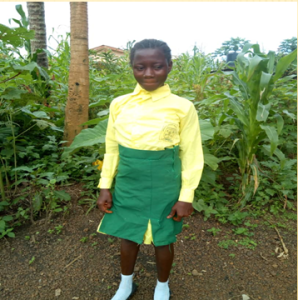
The Power of school Feeding/what is changing
Current project intervention is far more than food-giving. They are an investment in the country’s most vulnerable children. They are an investment in our common future and national stability. Activities carried out can bring children into school and out of hunger. Strong partnerships networking increase factors that pull children to school.
Overall, our school feeding programs have directly increased the educational and nutritional status of recipient children, and indirectly impact the economic and social lives of themselves and their families. Basic education is seen as a necessary condition for development. In addition, it is seen as a right for every child. In rural schools through the intervention of project activities, many schools have enrolled lots of vulnerable pupils whom their parents are poor and some are totally orphans.
Overall, our school feeding programs have directly increased the educational and nutritional status of recipient children, and indirectly impact the economic and social lives of themselves and their families. Basic education is seen as a necessary condition for development. In addition, it is seen as a right for every child. In rural schools through the intervention of project activities, many schools have enrolled lots of vulnerable pupils whom their parents are poor and some are totally orphans.
Overall, our school feeding programs have directly increased the educational and nutritional status of recipient children, and indirectly impact the economic and social lives of themselves and their families. Basic education is seen as a necessary condition for development. In addition, it is seen as a right for every child. In rural schools through the intervention of project activities, many schools have enrolled lots of vulnerable pupils whom their parents are poor and some are totally orphans.
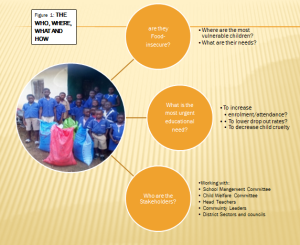
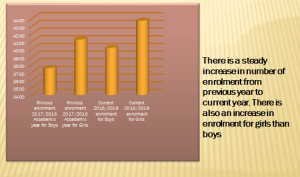
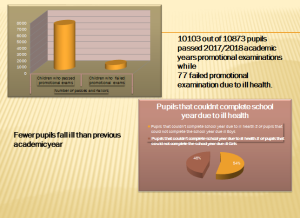
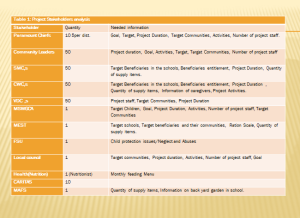
School Feeding Food Basket in gm
- Rice 120gm
- Pulses (Beans) 30gm
- Fortified vegetable oil 10gm
- Iodized Salt 05 gm
- Tomato
- Onion
- Palm oil
The food basket will provide each child 653 kilocalories per day.
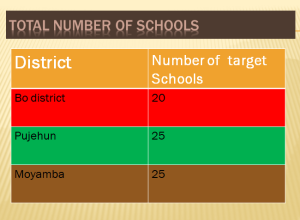
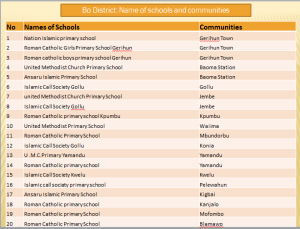
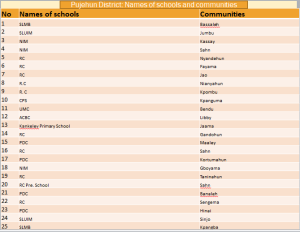
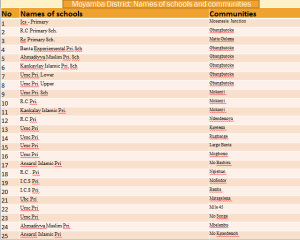
Summery and breakdown of data
Total Enrolment of target schools
17054
Total Boys: 8042
Total Girls: 9012
Pujehun District total: 5115
Boys: 2328
Girls: 2787
Bo District total: 5569
Boys: 2668
Girls: 2901
Moyamba District total: 6370
Boys: 3046
Girls: 3324
SUSTAINABILITY
School Feeding project is defined within the government National School Feeding Secretariat School Feeding plan and as such it will help to complement the government’s national school feeding initiative. Key on Government free quality education drive is its school feeding initiative to which government does not have the capacity to provide food nationwide. This project will contribute a lot to fill in the gap the national government school feeding will create or non-government targeted school for school feeding support. Project activities will be strictly supervised by the government through the National School Feeding Secretariat.
Furthermore, the Government of Sierra Leone has clearly prioritized issues on quality education, food, nutrition, and livelihood security in its various policies and plans. With specific reference to the school feeding program, school meals that are linked to agriculture production are a major component of the National School Feeding Strategy. Efforts are being made to expand school meals and shift towards government management. In order to reach national coverage for school meals, the national school feeding secretariat aims to look at more sustainable models using “homegrown” foods enabling schools to source food from community farmers that will not only improve livelihoods, but also the nutrition and health of the community children while they stay in school and finish their education. The ‘homegrown’ feeding approach will be adopted in this project to enhance the sustainability of the overall initiative.
The child protection components within this proposal are fundamentally aimed at sustainably preventing abuse and violence in the community by radically transforming attitudes towards the acceptability of violence. The interventions aim to stop the culture of violence and to end the intergenerational cycle of violence experienced by vulnerable children living in project communities. This cycle of violence against children is so prevalent that the government had to declare sexual violence as a Public Health Emergency. The high prevailing circumstances led the First Lady of the Republic of Sierra Leone to launch the Hands of our Girls initiative. It is now the responsibility of interested partner organizations to help the government raise awareness on the prevention of sexual penetration against girls in rural communities.
As mentioned before, this project is also aligned with government priorities outlined in government child protection strategies. This project furthermore strives to ensure that relevant ministries at the national and district level are central to the design and implementation of the project activities. This has been done through consultation meetings at the national and district level when for example choosing the respective districts, wards, and school communities to work within as target schools. Implementation and ownership of the program will further be strengthened by convening planning meetings prior to the commencement of the project with all relevant stakeholders, including district education committees and officers.
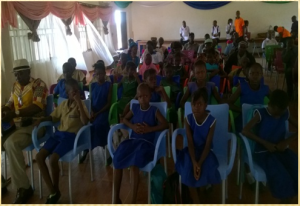
HOMEGROWN SCHOOL FEEDING PROGRAMME (HGSFP)
Caritas Sierra Leone Bo has embarked on promoting HGSFP.
This initiative is a sustainable drive towards promoting Nutrition and Food Security especially in rural communities.
As part of this action, rural farmers most of whom are also parents, grow local foodstuffs that are accessible, affordable, and appreciated by the community children. The children eat in schools what they are used to at home.
In this process, rural farmers have a ready market for their products and increased household economy. They also become job creators by employing community people to work on their farms. Additionally, new farming techniques are acquired especially Climate Smart Agricultural approaches.
This year Caritas Sierra Leone Bo has cultivated 45 hectares of rice on the Boli land in Kowa Chiefdom Moyamba District as a pilot phase in the COVID-19 pandemic context.
It is anticipated that with the availability of funds, this initiative will be cascaded in 70 rural communities to feed 15,500 rural poor children in Southern Sierra Leone. The supply of an improved variety of seeds will boost local food production. Other crops such as cassava, potatoes, yams will also be cultivated.
How will this be aligned with the promotion of the Free Quality Education Initiative? Research has shown that children who eat a balanced diet as a sustained way of life are more likely to perform better in academic work. They will have increased cognition. School retention and completion will be increased.
The nutritional status of the children will be improved thereby reducing absenteeism due to poor health.
Caritas Sierra Leone is seeking collaboration to support this process.
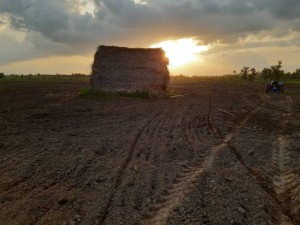
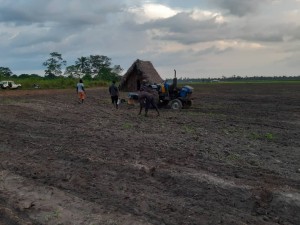
LOCALLY MADE FARM HUT SEED HARROWING IN PROGRESS
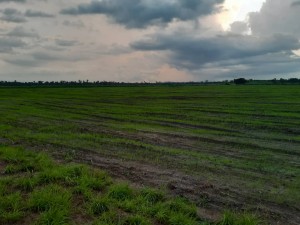
SPROUTING ROCK 34
Caritas Bo works closely with the Catholic Education Secretary Rev. Fr. Michael Selenga-Bassie for the promotion of access to quality basic education in the four districts in Southern Sierra Leone. As the development arm of the Diocese, Caritas Bo engages in the construction of schools, provision of teaching and learning materials. We also support other missions such as The Methodist Mission in the construction of three classrooms, VIP toilets, and Hand Pump costing approximately 96,000euros through support from Manos Unidas. This project was considered quite interesting as it promotes Girl Child Education in the diocese. With funds provided by Kindermissionwerk, Caritas is constructing three Primary schools in Bo North. Phase one of the project will be completed by June 2015.